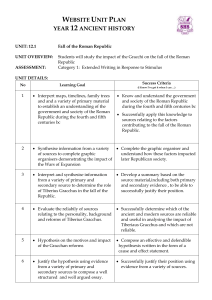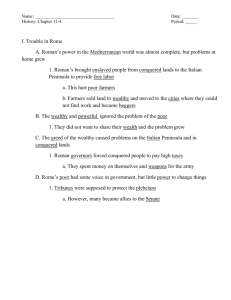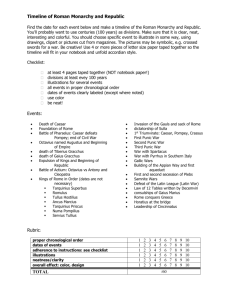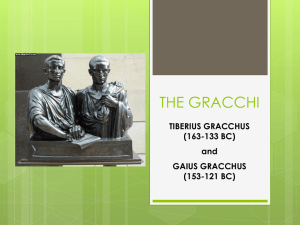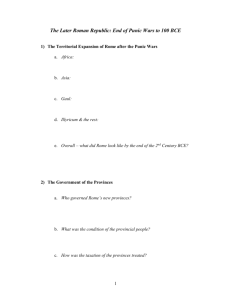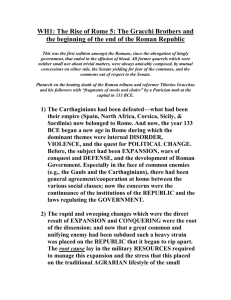1 Tiberius Gracchus: Ti. Sempronius Gracchus was tribune of the
advertisement
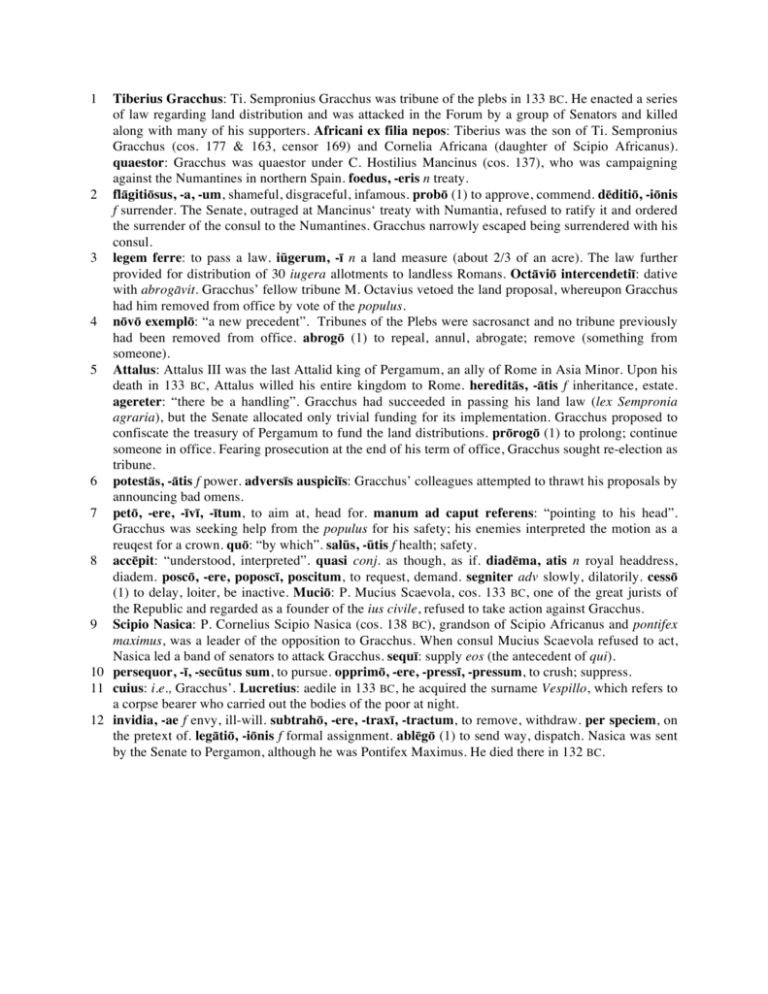
1 Tiberius Gracchus: Ti. Sempronius Gracchus was tribune of the plebs in 133 BC. He enacted a series of law regarding land distribution and was attacked in the Forum by a group of Senators and killed along with many of his supporters. Africani ex filia nepos: Tiberius was the son of Ti. Sempronius Gracchus (cos. 177 & 163, censor 169) and Cornelia Africana (daughter of Scipio Africanus). quaestor: Gracchus was quaestor under C. Hostilius Mancinus (cos. 137), who was campaigning against the Numantines in northern Spain. foedus, -eris n treaty. 2 flāgitiōsus, -a, -um, shameful, disgraceful, infamous. probō (1) to approve, commend. dēditiō, -iōnis f surrender. The Senate, outraged at Mancinusʻ treaty with Numantia, refused to ratify it and ordered the surrender of the consul to the Numantines. Gracchus narrowly escaped being surrendered with his consul. 3 legem ferre: to pass a law. iūgerum, -ī n a land measure (about 2/3 of an acre). The law further provided for distribution of 30 iugera allotments to landless Romans. Octāviō intercendetiī: dative with abrogāvit. Gracchus’ fellow tribune M. Octavius vetoed the land proposal, whereupon Gracchus had him removed from office by vote of the populus. 4 nōvō exemplō: “a new precedent”. Tribunes of the Plebs were sacrosanct and no tribune previously had been removed from office. abrogō (1) to repeal, annul, abrogate; remove (something from someone). 5 Attalus: Attalus III was the last Attalid king of Pergamum, an ally of Rome in Asia Minor. Upon his death in 133 BC, Attalus willed his entire kingdom to Rome. hereditās, -ātis f inheritance, estate. agereter: “there be a handling”. Gracchus had succeeded in passing his land law (lex Sempronia agraria), but the Senate allocated only trivial funding for its implementation. Gracchus proposed to confiscate the treasury of Pergamum to fund the land distributions. prōrogō (1) to prolong; continue someone in office. Fearing prosecution at the end of his term of office, Gracchus sought re-election as tribune. 6 potestās, -ātis f power. adversīs auspiciīs: Gracchus’ colleagues attempted to thrawt his proposals by announcing bad omens. 7 petō, -ere, -īvī, -ītum, to aim at, head for. manum ad caput referens: “pointing to his head”. Gracchus was seeking help from the populus for his safety; his enemies interpreted the motion as a reuqest for a crown. quō: “by which”. salūs, -ūtis f health; safety. 8 accēpit: “understood, interpreted”. quasi conj. as though, as if. diadēma, atis n royal headdress, diadem. poscō, -ere, poposcī, poscitum, to request, demand. segniter adv slowly, dilatorily. cessō (1) to delay, loiter, be inactive. Muciō: P. Mucius Scaevola, cos. 133 BC, one of the great jurists of the Republic and regarded as a founder of the ius civile, refused to take action against Gracchus. 9 Scipio Nasica: P. Cornelius Scipio Nasica (cos. 138 BC), grandson of Scipio Africanus and pontifex maximus, was a leader of the opposition to Gracchus. When consul Mucius Scaevola refused to act, Nasica led a band of senators to attack Gracchus. sequī: supply eos (the antecedent of qui). 10 persequor, -ī, -secūtus sum, to pursue. opprimō, -ere, -pressī, -pressum, to crush; suppress. 11 cuius: i.e., Gracchus’. Lucretius: aedile in 133 BC, he acquired the surname Vespillo, which refers to a corpse bearer who carried out the bodies of the poor at night. 12 invidia, -ae f envy, ill-will. subtrahō, -ere, -traxī, -tractum, to remove, withdraw. per speciem, on the pretext of. legātiō, -iōnis f formal assignment. ablēgō (1) to send way, dispatch. Nasica was sent by the Senate to Pergamon, although he was Pontifex Maximus. He died there in 132 BC.
